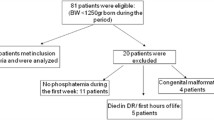Abstract
Extremely immature newborns develop a self-limiting normal anion gap metabolic acidosis in early life. This study examined the natural history of this acidosis in a population of infants of gestation less than 26 weeks in the first 14 days of life. The acidosis was maximal on day 4 with a mean base deficit of 10.6 mmol/l and had resolved in 90 % of infants by day 11. Dopamine usage was the only independent predictor of the acidosis. Its use was associated with a greater degree of acidosis. Conclusion: Extremely preterm infants experience a self-limiting normal anion gap metabolic acidosis in the first 2 weeks of life which is consistent with renal tubular immaturity.




Similar content being viewed by others
References
Ammari AN, Schulze KF (2002) Uses and abuses of sodium bicarbonate in the neonatal intensive care unit. Curr Opin Pediatr 14:151–156
Aschner JL, Poland RL (2008) Sodium Bicarbonate: basically useless therapy. Pediatrics 122:831–835
Berg CS, Barnette AR, Myers BJ, Shimony MK, Barton AW, Inder TE (2010) Sodium bicarbonate administration and outcome in preterm infants. J Pediatr 157:684–687
Bourchier D (2005) Plasma aldosterone levels in the first week of life in infants of gestation less than 30 weeks. Eur J Pediatr 164:141–145
Capasso G, Kinne R, Malnic G, Giebisch G (1986) Renal bicarbonate reabsorption in the rat. 1. Effects of hypokalemia and carbonic anhydrase. J Clin Invest 78:1558–1567
Corbet AJ, Adams JM, Kenny JD, Kennedy J, Rudolph AJ (1977) Controlled trial of bicarbonate therapy in high-risk premature newborn infants. J Pediatr 91:771–776
Deshpande SA, Ward Platt MP (1997) Association between blood lactate and acid-base status and mortality in ventilated babies. Arch Dis Child 76:F15–F20
Fanconi S, Burger R, Ghelfi D, Uehlinger J, Arbenz U (1993) Hemodynamic effects of sodium bicarbonate in critically ill neonates. Intensive Care Med 19:65–69
Felder CC, Campbell T, Albrecht F, Jose PA (1990) Dopamine inhibits Na+/H+ exchanger activity in renal BBMV by stimulation of adenylate cyclase. Am J Physiol Ren Physiol 259:F297–F303
Fuller GR, MacLeod MB, Pitts RF (1955) Influence of administration of potassium salts on the renal tubular reabsorption of bicarbonate. Am J Physiol 182:111–118
Goldstein RF, Thompson RJ, Ochler JM, Brazy JE (1995) Influence of acidosis, hypoxemia and hypotension on neurodevelopmental outcome in very low birthweight infants. Pediatrics 95:238–243
Guillery EN, Karniski LP, Mathews MS, Robillard JE (1994) Maturation of proximal tubule Na+/H+ antiporter activity in sheep during transition from fetus to newborn. Am J Physiol 267(Renal Fluid Electrolyte Physiol.36):F537–F545
Hafstrom M, Ehnberg S, Blad S, Noren H, Renman C, Rosen KG et al (2012) Developmental outcome at 6.5 years after acidosis in term newborns: a population-based study. Pediatrics 129(6):e1501–e1507
Hamm LL, NaKhoul NL (2007) Renal acidification. In: Brenner BM (ed) Brenner and Rector’s the kidney, 8th edn. Saunders Elsevier, Philadelphia, pp 248–304
Howell JH (1987) Sodium bicarbonate in the perinatal setting—revisited. Clin Perinatol 14:807–816
Kermorvant-Duchemin E, Iacobelli S, Eleni-Dit-Trolli S, Bonsante F, Kermorvant C, Sarfati G et al (2012) Early chloride intake does not parallel that of sodium in extremely-low-birth-weight infants and may impair neonatal outcomes. J Pediatr Gastroenterol Nutr 54:613–619
Kerpel-Fronius E, Heim T, Sulyok E (1970) The development of the renal acidifying processes and their relation to acidosis in the low-birth-weight infants. Biol Neonate 15:156–168
Koch G, Wendel H (1968) Adjustment of arterial blood gases and acid-base in the normal newborn infant during then first week of life. Biol Neonate 12:136–161
Lorenz JM, Kleinman LI, Markarian K, Oliver M, Fernandez J (1999) Serum anion gap in the differential diagnosis of metabolic acidosis in critically ill newborns. J Pediatr 135:751–755
Malan AF, Evans A, De V. Heese H (1965) Serial acid-base determinations in normal premature and full-term infants during the first 72 hours of life. Arch Dis Child 40:645–650
Noori S, Wu T-W, Seri I (2013) pH effects on cardiac function and systemic resistance in preterm infants. J Pediatr 162(5):958–963
Rachoin J-S, Weisberg LS, McFadden CB (2010) Treatment of lactic acidosis: appropriate confusion. J Hosp Med 5:E1–E7
Ramiro-Tolentino SB, Markarian K, Kleinman LI (1996) Renal bicarbonate excretion in extremely low birth weight infants. Pediatrics 98:256–261
Saenz P, Brugada M, de Jongh B, Sola A, Torres E, Moreno L et al (2011) A Survey of intravenous bicarbonate in neonatal asphyxia among European neonatologists: gaps between scientific evidence and clinical practice. Neonatology 99(3):170–176
Sato T, Takahashi N, Komatsu Y, Wada M, Matsunaga M, Ito K et al (2002) Urinary acidification in extremely low birthweight infants. Early Hum Dev 70:15–24
Seri I (2008) Acid-base homeostasis in the fetus and newborn. In: Oh W, Guignard J-P, Baumgart S, editors; Polin RA, consulting editor. Nephrology and fluid/electrolyte physiology: neonatology questions and controversies. Saunders Elsevier, Philadelphia, p 66–75
Svenningsen NW (1974) Renal acid-base titration studies in infants with and without metabolic acidosis in the postneonatal period. Pediatr Res 8:659–672
Yu J, Payne WW, Ifekwunigwe A, Stevens J (1965) Biochemical status of healthy premature infants in the first 48 hours of life. Arch Dis Child 40:516–525
Zilleruelo G, Sultan S, Bancalari E, Steele B, Strauss J (1986) Renal bicarbonate handling in low birth weight infants during metabolic acidosis. Biol Neonate 49:132–139
Conflict of interest
The authors have no conflicts of interest to disclose.
Author information
Authors and Affiliations
Corresponding author
Additional information
Communicated by Peter de Winter
Rights and permissions
About this article
Cite this article
Bourchier, D., Weston, P.J. Metabolic acidosis in the first 14 days of life in infants of gestation less than 26 weeks. Eur J Pediatr 174, 49–54 (2015). https://doi.org/10.1007/s00431-014-2364-9
Received:
Revised:
Accepted:
Published:
Issue Date:
DOI: https://doi.org/10.1007/s00431-014-2364-9




